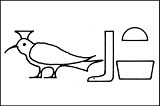May 19, 2017
|
Friday words, 2017-05-19
|
3940 hit(s)
I was being whiny to my wife about the endless non-appearance of spring here in Seattle, and then I saw some pictures of Denver and Cheyenne blanketed in snow. Maybe better I should stick with just words rather than weather-whingery.
The new-to-me word this week has some lovely linguistic properties. The word is buycott. Obviously, this derives from boycott (to refuse to interact with a company because you object to its policies), which we'll talk about in a moment.
 In the context I heard buycott (an episode of the "Hidden Brain" podcast), it was used to mean deliberately buying something from a company that you want to support, for social or political reasons. For example, some people went of their way to buy sandwiches at Chick-Fil-A to show support for the company's explicit opposition to same-sex marriage. This is the sense defined in Wikidictionary.
In the context I heard buycott (an episode of the "Hidden Brain" podcast), it was used to mean deliberately buying something from a company that you want to support, for social or political reasons. For example, some people went of their way to buy sandwiches at Chick-Fil-A to show support for the company's explicit opposition to same-sex marriage. This is the sense defined in Wikidictionary.
Interestingly, the Collins dictionary online has a related but different meaning. In their definition, a buycott means "a type of protest aimed at a company or country with dubious ethical standards in which consumers buy the products of another company or country." Either way, of course, the idea of a buycott is that it's a political statement manifested economically, or to put that more clearly, to vote with your wallet. (There's an app.)
The term seems to be relatively new. It's mostly not listed in dictionaries, excepting the previous two links, not even in Urban Dictionary (!). The earliest reference I could find was from 2010 (in a French paper, odd), where it's in quotes—always a clue that maybe the term is new.
Anyway, the more interesting thing to me is how the term was formed. Boycott is an eponym—it memorializes (ahem) a land agent who tussled with tenant farmers in Ireland in the 1880s. So there are no constituent parts to the word boycott per se; it's just a name. The jump from boycott (avoid) to buycott (embrace) was clever wordplay. And it promotes the –cott part of the original name into a particle—what the linguist Arnold Zwicky calls a libfix ("liberated pre/post/infix")—that can be reused generically to mean something like "economic political activity." This isn't the only example—there's also girlcott, which actually has various different meanings. Whether the –cott libfix can be extended to be used with prefixes that don't play on boy remains to be seen.
 For unexpected etymology today we have adobe. Everyone in the US knows that this is from Spanish, right? Well, yes. But it actually has a deeper history than that. The Spanish got it from Arabic al-tuba. Arabic speakers actually got it from the Coptic word tob. (In case you don't know, Coptic is the pre-Arabic language spoken in Egypt.) Coptic inherited the word from earlier stages of the language; in ancient Egyptian, the word was something represented today as Dbt. The picture over there shows the hieroglyph for this word. People have been making bricks from mud forever, of course. What's cool to me is that we've been able to use effectively the same word for millennia. (Credit for alerting me to this etymology goes to an article in the New Yorker.)
For unexpected etymology today we have adobe. Everyone in the US knows that this is from Spanish, right? Well, yes. But it actually has a deeper history than that. The Spanish got it from Arabic al-tuba. Arabic speakers actually got it from the Coptic word tob. (In case you don't know, Coptic is the pre-Arabic language spoken in Egypt.) Coptic inherited the word from earlier stages of the language; in ancient Egyptian, the word was something represented today as Dbt. The picture over there shows the hieroglyph for this word. People have been making bricks from mud forever, of course. What's cool to me is that we've been able to use effectively the same word for millennia. (Credit for alerting me to this etymology goes to an article in the New Yorker.)
Like this? Read all the Friday words.
 |
|

 |
|
